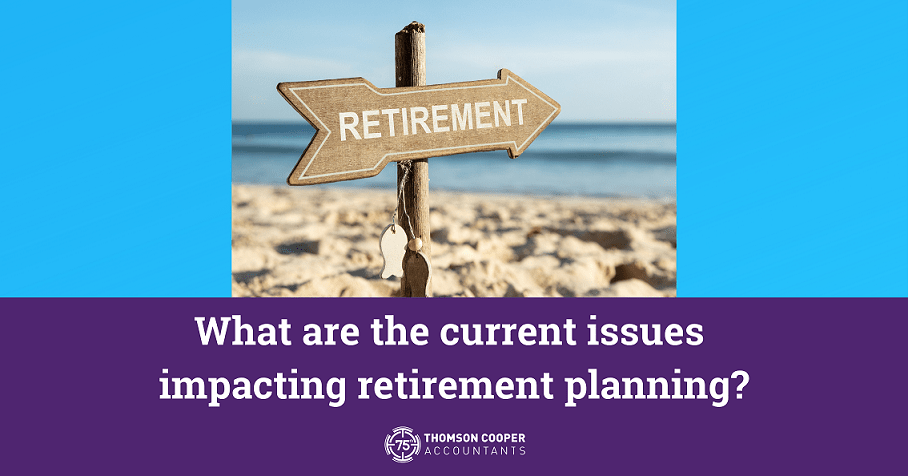Retirement Planning
As the UK navigates a changing political and economic environment, planning for retirement has never been more important. Changes in policy both locally and at a global scale have created inflationary pressures, and tariff wars as a result of the new Trump administration have stoked volatility in markets. Furthermore, potential changes to pension rules are causing concern amongst individuals and careful consideration should be given to securing financial futures. Understanding the current environment is crucial to building a secure and sustainable retirement plan.
1. Inflation
Inflation as measured by the Office of National Statistics remains a key concern for policy makers. Whist inflation is lower now than the spikes following the Covid pandemic, it has not yet reached the UK Government’s target of 2%. This means that the costs of goods and services continue to rise with the knock-on impact of a reduction in the value of savings. Furthermore, as prices rise, there is less scope for people to absorb these costs if they are on a fixed income, such as for retirees. Those in work may be able to negotiate a wage rise to combat the increases in their household budgets.
However, interest rates have increased from their historic lows, in order to combat this inflation, and this will provide welcome relief for savers. Those rolling off fixed rate mortgages may well feel the pinch as they negotiate in an environment of higher interest rates and it pays to shop around for the best rates when refinancing.
2. Market Volatility
The new Trump administration ushered in an era of tariffs, not seen in the United States for decades. Generally, markets do not like the uncertainty of tariffs and this was reflected in the volatility seen in US and global markets following his announcements on ‘Liberation Day’ with pension fund values bouncing around in value. This volatility is actually a positive for those saving into workplace and private pensions using regular contributions, as they are able to purchase more of the pension fund when markets are lower, providing a boost as they recover. This is a concept known as pound cost averaging and those invested for the longer term should not be overly concerned with a little bit of market volatility now, when the pension may not be accessed for decades to come. The converse is also true and market volatility is not welcome where access is required to long term savings in this environment. With careful planning such volatility can be managed to avoid nasty shocks.
3. Pensions Policy
It cannot be denied that ‘Auto-Enrolment’ has changed workplace pensions for the better and thanks to this policy, participation in workplace savings has increased dramatically. However, the percentage levels of contributions for employee and employer have levelled as set in legislation with no further increases planned as yet. Consideration must be given to the level of contributions to establish whether this will be sufficient to provide a comfortable retirement. Furthermore, state pension ages are set to be increased, meaning that careful planning is required on both counts to ensure that individuals are on target for their retirement.
The UK Government are also planning to change the legislation to bring unused pensions into the mix for Inheritance Tax. At present, the final legislation has not been implemented, and the Government are still at the consultation stage. Again, with careful planning should the legislation actually be implemented, any Inheritance Tax on pensions could be mitigated when following a financial plan.
The case for pensions savings
From the points made above, against an uncertain global backdrop, investing in pensions in this environment may seem unattractive.
However, it is important to remember that pensions are a hugely tax efficient way to save for the future. Generous tax relief is provided for each personal contribution, and the funds grow in a tax advantageous environment, free from capital gains and income taxes whilst invested. Furthermore, under present rules, 25% of the pension pot remains tax-free, up to certain limits. There are also several ways that the pension can be accessed, providing huge flexibility in retirement. This allows individuals to draw down funds to suit their own circumstances, or indeed to purchase a guaranteed income for life with all or part of their pension pot.
Given the long-term nature of pensions investment, the positives outweigh the negatives as covered in mainstream media. Pensions in the UK remain the backbone of personal retirement planning and will continue to remain so despite the short-term market fluctuations and policy changes announced by the Government.
A secure and enjoyable future should not be left to chance so reviewing your retirement strategy and planning ahead as early as possible is recommended. And remember, if you are looking for a financial adviser to support your planning, ensure they are suitably qualified and regulated.
If you wish to discuss your retirement planning requirements with us, please email info@thomsoncooper.com.
Footnote
Richard Libberton is Head of Wealth Management at Thomson Cooper. He is a Chartered Financial Planner who has held a number of senior positions within some of the UK’s largest mutual life, pensions and investments companies during his career. He is responsible for managing the financial planning and investment requirements of clients.
Richard is a Fellow and past Chair of the Personal Finance Society Central Scotland Region, and an advocate for diversity and improving standards in advice. Richard has also contributed to thought leadership initiatives, joining BBC Radio Scotland to chat about the value of Life Assurance, Income Protection & Critical Illness Cover, as part of their Clever About Cash series.
The information contained within this article is for information only purposes and does not constitute financial advice or recommendations. Thomson Cooper cannot assume legal liability for any errors or omissions it might contain. The value of investments can go down as well as up and you may not get back the full amount you invested. The past is not a guide to future performance and past performance may not necessarily be repeated.


